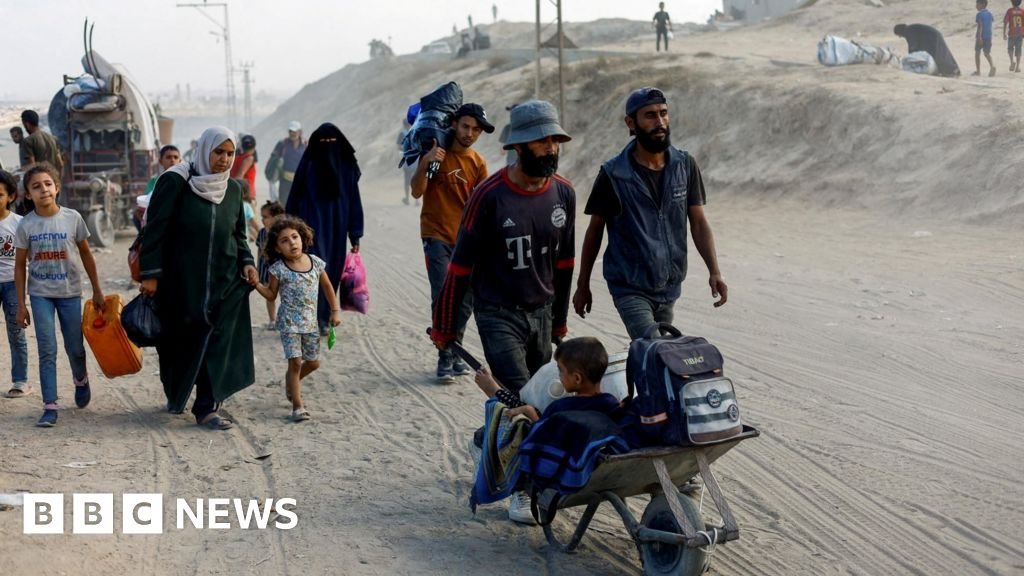Thousands of Palestinians are continuing to flee Gaza City, as Israel’s major ground offensive aimed at occupying the city enters a second day.
Amid large-scale bombardment overnight, Gaza’s Hamas-run health ministry said al-Ranitisi children’s hospital was targeted in three separate Israeli attacks, forcing half of its patients and their families to flee. The Israeli military said it was looking into the report.
Other hospitals said at least 35 people had been killed by Israeli fire across Gaza so far on Wednesday, most of them in the north.
Earlier, the Israeli military announced that it had struck more than 150 “terror targets” across Gaza City in two days in support of its ground forces.
Israel says its aim is to free its hostages and defeat up to 3,000 Hamas fighters in what it describes as the group’s “last stronghold”, but the offensive has drawn widespread international condemnation.
The leaders of more than 20 major aid agencies, including Save the Children and Oxfam, warned that “the inhumanity of the situation in Gaza is unconscionable”. With world leaders due to gather for the UN General Assembly next week, they called for “urgent intervention”.
For days, huge columns of Palestinians have streamed southwards from Gaza City in donkey carts, rickshaws, vehicles strapped high with belongings, and on foot.
Until now, they have been forced to flee down the main coastal road to an Israel-designated “humanitarian area” in al-Mawasi.
But on Wednesday, the Israel Defense Forces (IDF) announced that it would open temporarily a second route for people to travel on – the central Salah al-Din road. It said the route would be open for 48 hours from 12:00 local time (10:00 BST).
Many Palestinians say they are unable to move south due to the rising costs associated with the journey. Some say renting a small truck now costs around 3,000 shekels ($900; £660), while a tent for five people sells for about 4,000 shekels.
Lina al-Maghrebi, 32, a mother of three from the city’s Sheikh Radwan neighbourhood, told the BBC: “I was forced to sell my jewellery to cover the cost of displacement and a tent.”
“It took us 10 hours to reach Khan Younis, and we paid 3,500 shekels for the ride. The line of cars and trucks seemed endless.”
Aid groups, UN agencies and others say the “humanitarian area” they are expected to move to is heavily overcrowded and insufficient to support the roughly two million Palestinians who are expected to cram into it.
Some Palestinians who followed the military’s orders to evacuate to the zone say they found no space to pitch their tents and so returned north.
The IDF said on Tuesday that around 350,000 people had fled Gaza City, while the UN put the figure at 190,000 since August. Estimates suggest at least 650,000 remain.
As part of its operations, the IDF is reportedly utilising old military vehicles loaded with explosives that have been modified to be controlled remotely.
They are being driven to Hamas positions and detonated, according to Israeli media.
Meanwhile, families of the 48 remaining hostages held by Hamas – 20 of whom are believed to be alive – protested near Israeli Prime Minister Benjamin Netanyahu’s residence in Jerusalem on Tuesday and Wednesday, arguing that the offensive would endanger their loved ones.
“All day long, you boast about killing and destruction,” said Macabit Mayer, aunt of hostages Gali and Ziv Berman. “Bringing down buildings in Gaza – who are you bringing these buildings down on?”
“Could it be that you are bringing these buildings down right now on Gali and Ziv and all the souls left there – the living and the deceased?”
The offensive has been widely criticised, with UN human rights chief Volker Türk describing it as “totally and utterly unacceptable”.
On Wednesday, Saudi Arabia said it condemned the assault “in the strongest terms”.
Pope Leo XIV meanwhile said conditions for Palestinians in Gaza were “unacceptable” and repeated his call for a ceasefire.
“I am deeply close to the Palestinian people of Gaza, who continue to live in fear and under unacceptable conditions, forced yet again to leave their land,” he told his weekly audience at the Vatican.
US Secretary of State Marco Rubio appeared to offer tacit support for Israel’s offensive during a joint press conference with Netanyahu on Monday.
He said the US preferred a negotiated end to the war, but that “sometimes when you’re dealing with a group of savages like Hamas, that’s not possible”.
It came as a United Nations Commission of Inquiry concluded that Israel had committed genocide against Palestinians in Gaza.
Among its findings were that Israeli security forces perpetrated sexual and gender-based violence, directly targeted children with the intention to kill them, and carried out a “systemic and widespread attack” on religious, cultural and education sites in Gaza.
Israel’s foreign ministry said it categorically rejected the report, denouncing it as “distorted and false”.
Israel launched its war in Gaza in response to the Hamas-led attack on southern Israel on 7 October 2023, in which about 1,200 people were killed and 251 others were taken hostage.
At least 64,964 people have been killed by Israel during its campaign since then, almost half of them women and children, according to Gaza’s health ministry.
With famine having already been declared in Gaza City by a UN-backed food security body, the UN has warned that an intensification of the offensive will push civilians into “even deeper catastrophe”.
Additional reporting by Rushdi Abualouf




